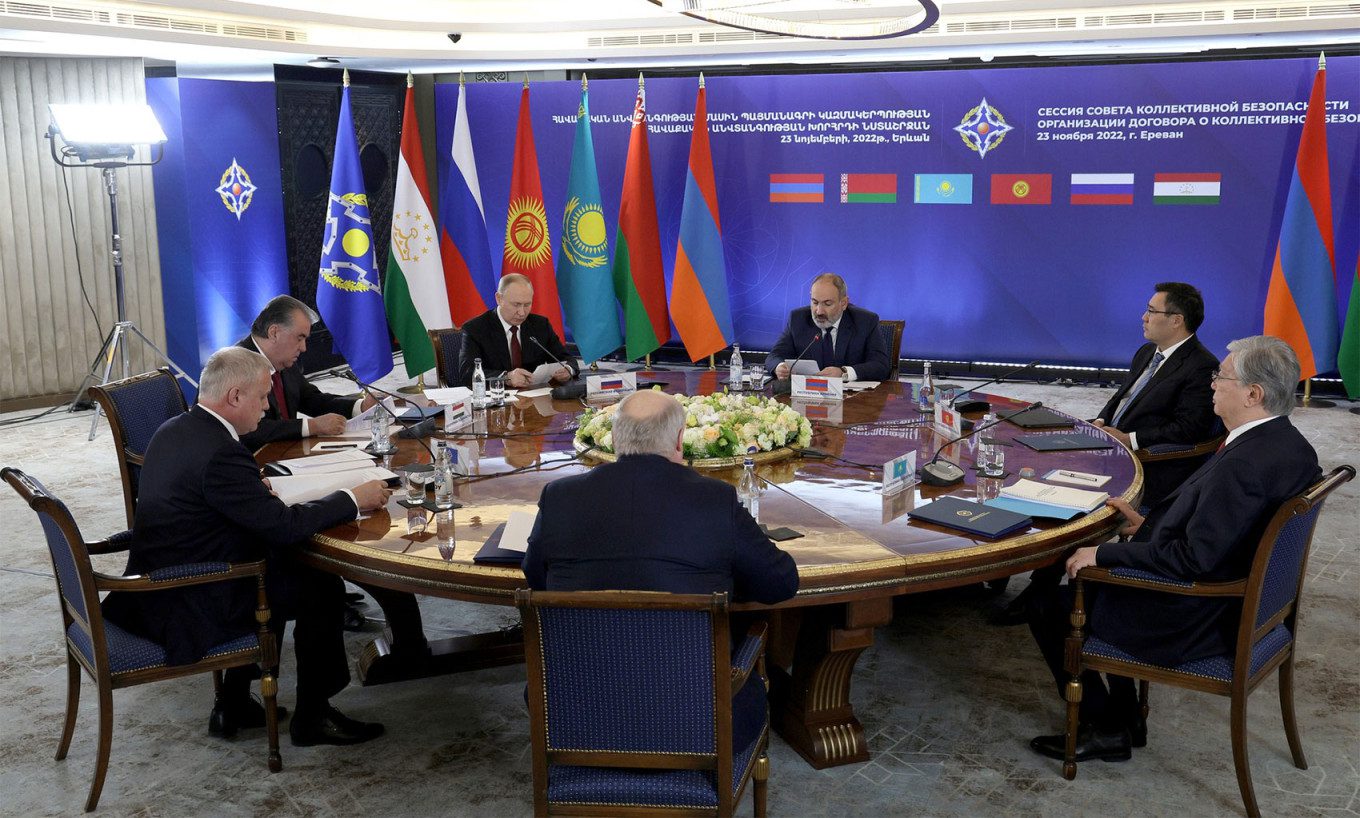Yerevan, Armenia — Russian President Vladimir Putin was greeted by street demonstrations in the capital of this landlocked South Caucasus nation on Wednesday when he arrived for talks with members of a Moscow-led military alliance.
Hundreds of Armenians and Russian immigrants participated in two-day demonstrations in central Yerevan to protest Putin’s visit, raising slogans including “Putin is a killer” and “No to war.”
“We must show that not all Russians support this,” said Sergey, an IT worker who recently moved to Yerevan, while taking part in an anti-war demonstration in Ukraine.
The boisterous reception for Putin on his first trip to Armenia since 2019 comes as military setbacks in Ukraine make the Russian leader appear increasingly isolated on the world stage — and as Russia even struggles to retain influence in the former Soviet Union’s countries. Middle Asia and the Caucasus.
While in the Armenian capital, Putin attended a summit of heads of state of the Collective Security Treaty Organization (CSTO) — a military bloc that includes Russia, Armenia, Belarus, Kazakhstan, Kyrgyzstan and Tajikistan — and was scheduled to meet with Armenian Prime Minister Nikol. Pashinyan.
“It is clear to us that our joint work within the framework of the Collective Security Treaty Organization brings clear practical results and helps protect national interests, sovereignty and independence of our countries,” Putin said. He said in the assembly.
However, Pashinyan used his welcoming speech to attack the CSTO coalition for its inaction in the ongoing conflict between Armenia and Azerbaijan.
“We have so far failed to decide on the reaction of the Collective Security Treaty Organization to Azerbaijan’s aggression against Armenia,” Pashinyan said.
“These facts greatly damage the image of the Collective Security Treaty Organization.”
Outside the meeting, Armenians and anti-war Russians who moved to Armenia held at least three rallies to protest Putin’s visit, Russian support for neighboring Azerbaijan and the Ukraine war.
Many Armenians blame Moscow – which they once considered a close ally – for what they see as its failure to help Yerevan in its conflict with Baku.
“Russia promised to protect us, but did the opposite,” Yuri Tatevasyan, 64, told the Moscow Times at a rally in the Armenian capital on Tuesday night.
Tatevasian added, “We have nothing against the Russian people — but we don’t want to be slaves of the Kremlin.”
“We want Armenia to be a free and democratic country.”
Putin has made few trips abroad since the start of Russia’s nine-month war in Ukraine, which has been criticized by the West and international bodies, including United nations.
The Russian leader earlier this month declined to attend a meeting of the Group of 20 major industrial nations, where world leaders were “strongly convicted the war.”
Putin lost his status as “first among equals” at CSTO meetings over the Ukraine war, according to Andrei Kolesnikov, a senior fellow at the Carnegie Endowment for International Peace, though regional leaders remain wary of the Kremlin.
“Members of the CSTO are also afraid of Putin’s Russia,” Kolesnikov added.
With Russia playing a key mediating role in the long-running conflict between Armenia and Azerbaijan, Yerevan is eager to secure the Kremlin’s support.
Vladimir Smirnov / TASS / The Kremlin
Armenia and Azerbaijan have fought two wars over the Armenian-majority populated region of Nagorno-Karabakh since the dissolution of the Soviet Union. Six weeks of fighting in the fall of 2020 claimed the lives of more than 6,500 soldiers on both sides and ended in a truce brokered by Russia.
“We have to keep in mind that the Russian peacekeepers are the guarantor of security,” former Armenian MP Arman Abovyan told The Moscow Times.
Even the Russian emigrants who protested Putin’s visit this week knew that Yerevan could not afford to alienate the Russian leader.
“Putin is still welcome in Armenia, unlike many countries,” Russian IT worker Sergei, who declined to give his surname, told The Moscow Times.
“Armenia does not want to quarrel with the Russian authorities.”
AFP contributed to the report.

“Subtly charming student. Pop culture junkie. Creator. Amateur music specialist. Beer fanatic.”

